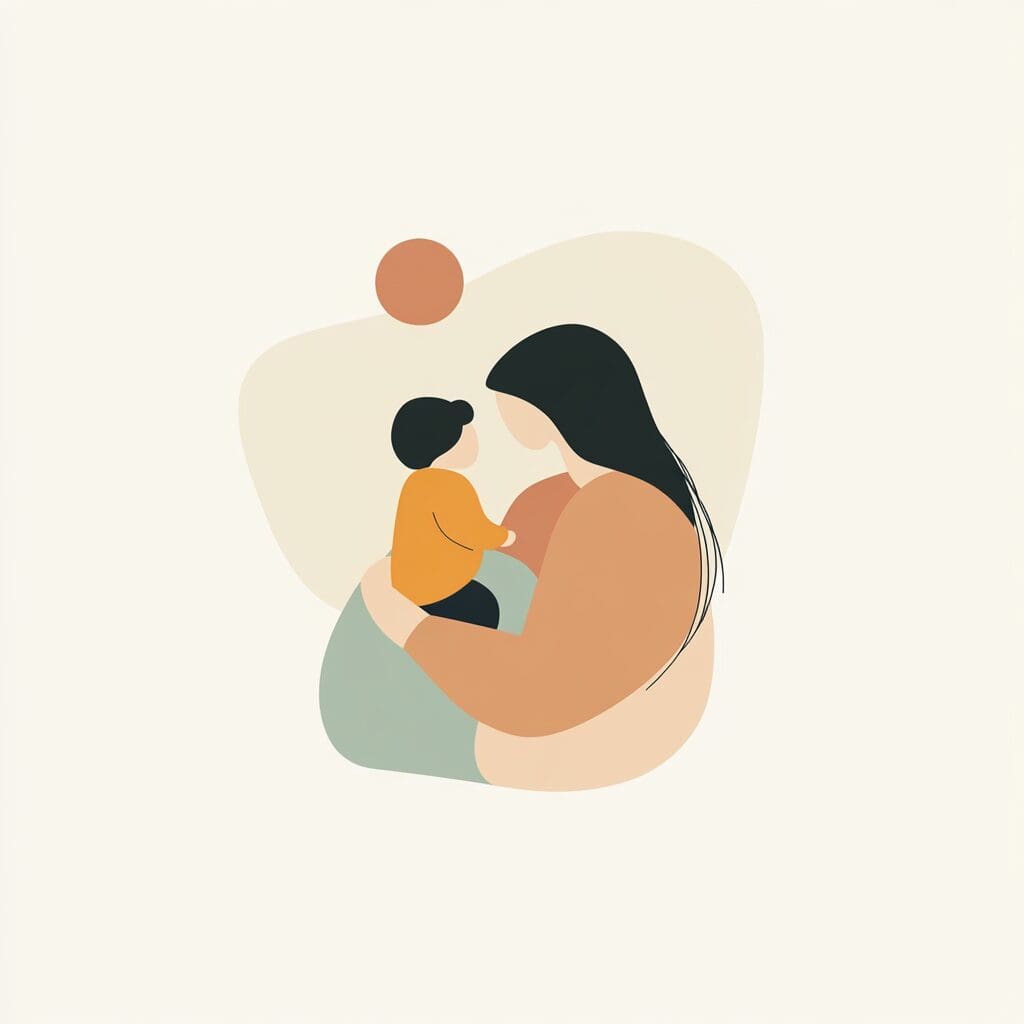Post-partum depression (PPD) affects many new mothers, creating a blend of intense emotions, mood swings, and feelings of inadequacy that can overshadow the joys of early motherhood.
Unlike the temporary “baby blues,” PPD is a deeper, longer-lasting form of depression that can interfere with daily life, relationships, and the mother’s connection with her baby.
Mothers with Post-Partum Depression often feel overwhelmed by unpredictable emotions, worsened by hormonal changes, sleep deprivation, and the immense responsibility of caring for a newborn. In this context, emotion regulation—the ability to understand, manage, and respond to emotions constructively—is essential for coping with PPD.
Dialectical Behaviour Therapy (DBT) offers a structured, evidence-based approach to managing these intense emotions, making it particularly valuable for mothers experiencing PPD. DBT has proven effective for a range of mental health challenges and focuses on four main skills: mindfulness, distress tolerance, emotion regulation, and interpersonal effectiveness.
These skills empower mothers to respond to their emotions in healthier ways, allowing them to manage emotional triggers, develop resilience, and cultivate self-compassion. This article will explore DBT emotion regulation techniques and show how they can be adapted to support new mothers in navigating PPD, helping them regain control and foster a stronger sense of well-being.
What is Post-Partum Depression?
Post-partum depression is a mood disorder that can affect mothers (and, in some cases, fathers) following the birth of a child. While it’s natural for new mothers to experience a range of emotions after delivery, Post-Partum Depression goes beyond the “baby blues,” which are typically mild and short-lived feelings of sadness or irritability. PPD is a more severe, persistent form of depression that can start anytime within the first year after childbirth. However, it often emerges in the first few weeks or months.
Key Symptoms of Post-Partum Depression
- Persistent sadness or hopelessness: Mothers may feel a constant despair that doesn’t lift, even with support from family or friends.
- Anxiety and worry: often mothers with PPD experience intense worry and fear, especially about their baby’s health or their ability to care for their child adequately.
- Irritability and anger: These emotions may seem irrational or disproportionate to the situation, but they are common symptoms of PPD.
- Exhaustion and lack of energy: Beyond regular sleep deprivation from caring for a newborn, mothers with PPD often feel emotionally and physically drained.
- Feelings of inadequacy and guilt: Mothers may feel as though they aren’t “good enough” or are failing in their role, leading to self-blame and shame.
- Loss of interest in activities: Things that once brought joy or relaxation may no longer appeal to mothers with PPD, further isolating them emotionally.
- Difficulty bonding with the baby: In severe cases, PPD can impact a mother’s ability to connect emotionally with her baby, adding to feelings of guilt and shame.
These symptoms can create a distressing experience that interferes with daily life, parenting, and personal relationships. For many mothers, the experience of PPD feels like being trapped in a cycle of negative emotions and self-doubt. Emotion regulation—the ability to constructively understand, modulate, and respond to emotions—is crucial in navigating these intense feelings.
Why Emotion Regulation Is Challenging for Mothers with PPD
- Hormonal Shifts: Mothers experience significant hormonal changes following childbirth, particularly in estrogen and progesterone levels.
- Sleep Deprivation: Sleep is essential for emotional resilience, but new mothers often face disrupted sleep, increasing their susceptibility to mood swings, irritability, and exhaustion.
- Social and Identity Shifts: The transition into motherhood is a profound change in identity, often bringing a mix of joy and uncertainty.
- Intense Self-Criticism: Many mothers with PPD report feeling intense guilt and shame, believing they are failing in their roles.
- Lack of Coping Strategies: Without effective coping mechanisms, many mothers find themselves “stuck” in cycles of negative emotions, with no clear path for handling the intensity of their feelings.
When these challenges combine, they can create a situation where negative emotions seem ever-present and difficult to escape. Without effective emotion regulation skills, mothers with PPD may experience a reinforcing cycle: intense emotions lead to negative thoughts, which in turn trigger more intense emotions, perpetuating feelings of despair and helplessness.
Importance of Developing Emotion Regulation Skills
Emotion regulation is not about avoiding or suppressing emotions but about learning how to experience, understand, and respond to them in healthier ways. For mothers with PPD, cultivating emotion regulation skills can bring several benefits:
- Increased Resilience: With better emotional management, mothers are better equipped to handle new motherhood’s inevitable challenges and stresses.
- Improved Bonding with the Baby: When mothers feel more in control of their emotions, they are more present and engaged, which can help strengthen the mother-baby bond.
- Reduced Guilt and Shame: Developing self-compassion and responding to emotions can lessen guilt and inadequacy.
- Enhanced Relationships: Emotion regulation skills also improve communication and help mothers seek support, strengthening relationships with partners, family, and friends.
- Personal Empowerment: With practical emotion regulation tools, mothers gain a sense of control, making them feel more capable of managing their PPD and its impact on their lives.
DBT offers a structured approach to building these essential skills, making it especially helpful for mothers with PPD. By learning to regulate emotions through DBT, mothers can begin to break the cycle of negative thoughts and emotions, opening the door to a more balanced, manageable experience of early motherhood.
From Medical Centric
Core Components of DBT
DBT is structured around four core skills that aid emotional and interpersonal functioning:
- Mindfulness: This foundational skill promotes present-moment awareness, allowing individuals to observe their thoughts and feelings without judgment, which helps in identifying emotions before they escalate.
- Distress Tolerance: This skill builds resilience in coping with crises and enduring emotional pain constructively, which is particularly helpful for mothers dealing with intense emotions.
- Emotion Regulation: These techniques help individuals understand and moderate their emotional responses, reducing the intensity of negative feelings and promoting healthier reactions.
- Interpersonal Effectiveness: A focus on assertiveness and boundary-setting, this skill set strengthens communication and relationships, which is crucial for mothers needing support from loved ones.
Each DBT component is valuable for managing PPD. However, this article will focus on emotion regulation as a tool for stabilising emotional responses in new mothers.
How DBT Can Help Mothers Respond to Intense Emotions
DBT’s emotion regulation skills are designed to help individuals understand their emotional patterns, identify triggers, and apply techniques that reduce the intensity of emotional responses. For mothers experiencing PPD, these skills can be transformative, allowing them to navigate complex emotions more effectively and fostering a sense of control over their emotional well-being. Here’s how DBT can specifically help mothers with PPD manage their intense emotions:
- Recognising Emotional Patterns: DBT teaches mothers to observe their emotional responses, helping them identify recurring patterns or triggers. By recognising these patterns, mothers can anticipate and prepare for emotional challenges, making it easier to apply coping strategies.
- Reducing Emotional Vulnerability: DBT offers strategies to help mothers become more resilient in emotional stress. By building positive experiences, getting adequate sleep, and practicing self-care, mothers can create a baseline of emotional stability, making it easier to manage mood swings and distressing emotions.
- Responding to Emotions Constructively: DBT emphasises skills like opposite action, which encourages mothers to engage in behaviours that counteract their negative emotional states. For example, suppose a mother feels isolated and withdrawn. In that case, she might practice the opposite action by reaching out to a friend or family member, which can help break the cycle of loneliness.
- Improving Self-Compassion and Acceptance: The dialectical approach in DBT emphasises the acceptance of emotions without self-criticism. This can be particularly helpful for mothers who feel ashamed of their struggles with PPD. DBT fosters a mindset that emotions are natural and manageable, helping mothers treat themselves with kindness and patience.
- Developing Skills for Crisis Situations: DBT’s distress tolerance skills provide mothers with tools to handle moments of acute emotional distress. Techniques like deep breathing, distraction, and self-soothing exercises enable mothers to “ride out” emotional storms without reacting impulsively or becoming overwhelmed. This is especially valuable during high-stress moments when caring for a newborn feels overwhelming.

Tips for Implementing DBT Emotion Regulation Skills in Daily Life
Starting with small, manageable DBT goals makes learning these skills easier for new mothers. Instead of attempting multiple techniques at once, they can focus on one, like practicing mindfulness during a specific part of their routine, such as feeding. Gradually incorporating these practices builds confidence and allows for a personalised pace.
1. Begin with Small Steps and Set Realistic Goals
When first learning DBT techniques, starting with small, achievable goals can make the process feel more manageable. Rather than trying to apply multiple techniques each day, a mother might focus on practicing just one skill, like mindfulness, during a specific part of her routine, such as feeding or putting her baby down for a nap. Gradually adding these small practices builds confidence and allows mothers to adapt the skills to fit their own pace and needs.
2. Integrate DBT Skills into Everyday Activities
Incorporating DBT skills into daily activities allows mothers to practice without needing to set aside extra time, which can be especially helpful during the busy post-partum period. Everyday moments—like feeding, changing, or soothing the baby—offer natural opportunities for practicing mindfulness, emotion labelling, or deep breathing. For example, during a feeding session, a mother could take the time to notice her breath, stay present with her baby, or check in with her emotions.
By aligning DBT practices with existing routines, mothers create consistent opportunities for emotional regulation without interrupting their daily flow. This approach fosters a sense of continuity and reinforces these skills in a way that fits seamlessly into the demands of new motherhood.
3. Build a Supportive Network
Practicing DBT skills can be significantly enhanced with a supportive network. Sharing the techniques with a partner, family member, or friend strengthens the mother’s commitment and provides emotional support. Loved ones familiar with DBT skills can gently remind mothers to use their techniques in moments of need, offering encouragement and perspective. For instance, if a mother struggles with isolation, a supportive partner might suggest “opposite action” by encouraging her to connect with others, even briefly.
4. Practice Self-Compassion Throughout the Process
Learning new ways of managing emotions is challenging, especially while navigating the demands of motherhood. Self-compassion is crucial in this journey, as it helps mothers approach their progress with patience and kindness. Rather than striving for perfection, mothers can focus on celebrating small victories—like identifying an emotion or successfully practicing mindfulness—reinforcing their efforts and growth.
When challenges arise, mothers can remind themselves that setbacks are natural. Embracing self-compassion also means prioritising gentle self-care, such as taking breaks when needed or asking for help. Recognising that healing is gradual and extending oneself grace makes it easier to stay committed and optimistic about integrating DBT skills for long-term emotional health.
Long Lasting Impact of DBT on Post-Partum Depression
Dialectical Behaviour Therapy (DBT) offers a practical approach for mothers with post-partum depression (PPD), providing tools to manage intense emotions and foster stability. By using DBT’s emotion regulation techniques, mothers can reduce the overwhelming effects of PPD, gain emotional control, and develop self-understanding.
Starting with small steps, like practicing mindfulness during daily tasks or choosing one opposite action per day, helps build confidence and makes a noticeable difference without adding stress. Consistent practice is essential, as these small routines gradually strengthen emotional resilience, allowing mothers to manage both PPD and the general demands of motherhood more effectively.
Ultimately, DBT skills give mothers with PPD a framework for self-compassion, resilience, and constructive emotional management. Over time, these skills can transform not only their experience of PPD but also their approach to parenting, providing a foundation of peace, confidence, and fulfilment in their journey through motherhood.
DBT and Post-partum FAQ's
Answer explaining DBT’s unique approach to managing emotions and promoting resilience.
Discuss the benefits of professional guidance, but note that some techniques can be self-practiced.
Highlight that results vary, but minor improvements can be noticeable within weeks of consistent practice.
Mindfulness practices and positive experience building to bond with the baby.
DBT is versatile and supports various mental health conditions. Still, it is constructive for those dealing with intense emotions, including PPD.


